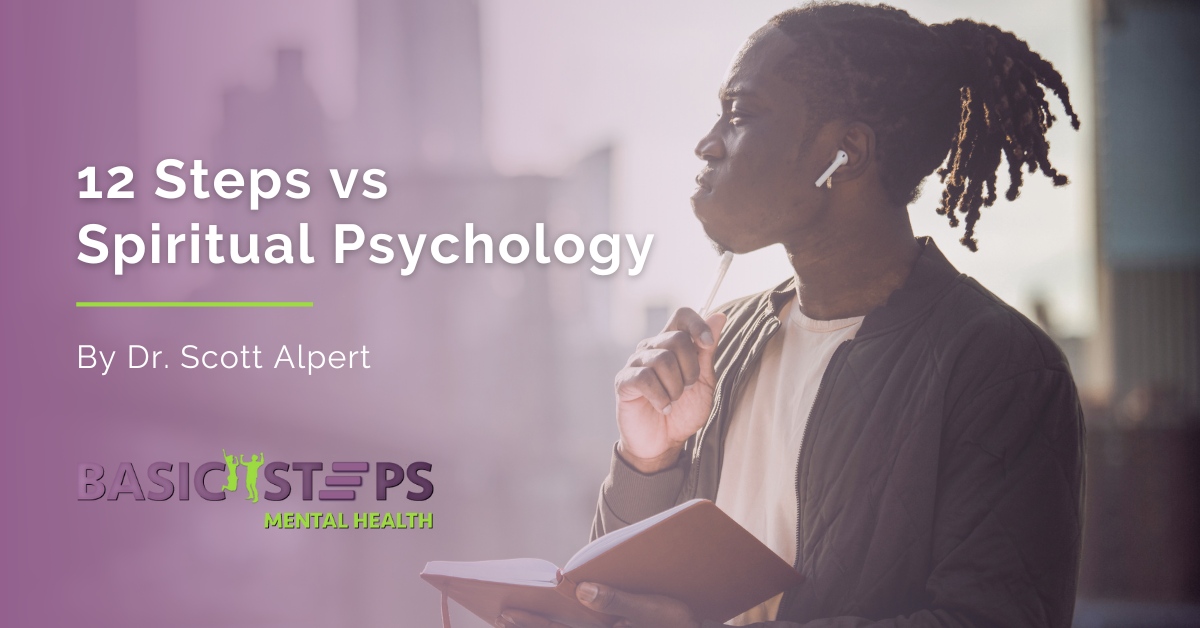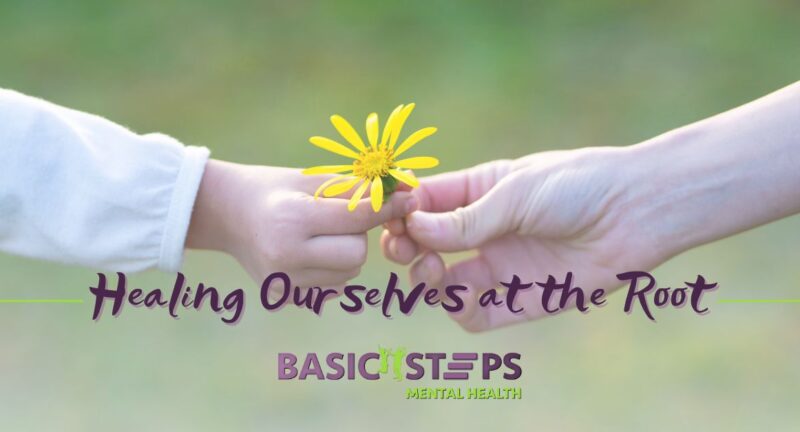
12 Steps vs Spiritual Psychology
When somebody remarked in group that our program is not the 12 Steps, a fire was ignited. And no, it is not. When I was admitted into graduate school, I had been working at a 12-Step facility for years and quickly learned that this was the real thing.
This is not to say that the 12 Steps are horrible and that people don’t heal and grow from its application, but being a brash young man, I believed that this newfangled treatment I was learning was the approach. This began a debate with my supervisor, Dr. Noah Young, for years. Dr. Young was a professor at Pepperdine, a minister of the Science of Mind Church, and had an IQ of 150. Trust me, Noah had a photographic memory and often would cite paragraphs by memory from books in his office. Debating him, with my IQ of barely 100, was quite a challenge.
The 12 Steps versus Spiritual Psychology – I went toe to toe with Dr. Noah, who had 20 years of sobriety using the 12-Step model. Not going through the 12 Steps myself, I couldn’t relate to having to proclaim I was powerless or having to beg forgiveness, but I did like elements of it. I just couldn’t buy into some force greater than myself restoring me to sanity. Did I want God to live my life for me, or did I want to live my life for God? This is what we tussled with throughout our friendship.
Are we powerless? According to Spiritual Psychology, we are powerful beyond measure. In the movie What the Bleep Do We Know!?, they present evidence through Quantum Physics that we can move matter just by the way we look at something. We are energy; molecules are not static but also energy, and when the two intersect, miracles take place.
If man was created in the image of God, according to Roberto Assagioli from Psychosynthesis, we have that blueprint of God within. As we tap into our personal blueprint, we create miracles. I know that AA reports being a spiritual program; however, their spirituality is outside a person by some force. Spiritual Psychology states that the force is within ourselves, and all we need to do is tap in.
We are not powerless, but powerful beyond measure. We have been trained to give our power to others and drain ourselves. Recovery is not waiting for something to make you better. Real recovery is taking the action steps yourself and having God meet you at your point of action. We call this “Co-Creation.”
Am I God? This was a question posed in school. For me, I didn’t create the universe but was created. Because I have a portion of God in me, why not use that image to better myself and others?
The first step in Spiritual Psychology is to learn to use our God-given ability to be great. Intention setting—basically creating a goal and stepping toward it—starts the journey. Right off the bat, it is different from the 12 Steps, which claim we are powerless. I ask people if they are willing to change and make an effort. If so, the next question is, “What is your intention?” Do you want to heal or wait for God, or a person, or the government to rescue you? What if they don’t? Or do you want to stand up and start the healing journey? The choice is yours.
In the second step of Spiritual Psychology, there is an internal battle between holding on to the new mindset of having ultimate power or falling back into being a victim (a baby that is dependent on others and wanting to be rescued).
In the second step of AA, a power greater than ourselves restores us to sanity. In Spiritual Psychology, we restore our sanity by holding onto our power, taking care of ourselves first, stopping the habit of trying to control and manipulate others, and taking ultimate control over ourselves. Here begins an exploration of our Ego—the rules we live by. Many of these rules were handed down by our family and shape the way we color life. When you find yourself upset by the actions of others, your Ego is engaged. Scrutinizing the Ego rules that run you and amending them is an incredible endeavor that helps you shed negativity and live more heart-centered. Ask yourself: Does everybody have to act the way I want them to? If the answer is no, then welcome aboard, fasten your seatbelt, and understand this is going to be a bumpy ride—but well worth it.
Here is an example of an Ego rule: “Everybody should be kind to one another.” Should they? If they aren’t, how do you react? That is on you. Changing the focus from others to improving yourself will improve your mood 50% right off the bat. Instead of making people be the way you want, give them a break. Instead of “Everybody has to…,” amend this to “I choose to….” For example: “I choose to be kind to others, and others are just going to be how they choose to be.”
Look, we have no control over others anyway, and the upset you have toward others comes from you. Do you want to be right, or do you want to be happy? Allow life around you to do what it does, because we have no control over anything but our own thoughts and actions. This doesn’t mean be passive. If their actions are harmful, take the needed action to protect yourself. What is emphasized here is that, in your everyday life, people may act in ways that are contrary to the way you do things. Make this okay. The saying is: There are many ways to skin a cat. Poor kitty. Is this easy? Of course it isn’t. We have programmed ourselves to judge, put others down, and make ourselves superior. This is all Ego-driven. Mother Teresa said, “If you judge people, you don’t have time to love them.” If we are all the same, then why would you judge you? In judging them, you are judging you.
And thus, our group that day got into the war stories of people trying to work the 12 Steps, especially with begging forgiveness. When people tell you they forgive you, does it make you feel better? These people in the group stated they didn’t trust it, nor did it have any impact on them whatsoever. Do people have the power to forgive? I don’t confess to having this power toward others. I personally feel forgiveness is a spiritual bypass. “Of course, I forgive you for bashing in the head of my son and making him a vegetable that I will need to care for the rest of his life.” I saw a husband and wife say this in court during the Rodney King Riot court case. “Forgive and forget” doesn’t work. A spiritual bypass is us bypassing processing an issue on the mental and emotional levels. Here is where my debate with Dr. Noah got heated. Are people in the 12 Steps addressing the issues of their past, processing through them by various methods? He agreed that no, they weren’t, and recommended that people in the 12 Steps attend individual therapy. This was when I got him. 100 IQ out-bested the scholar! And he added, the 12 Steps are a support network and not a psychological program. Drop the mic!
Nobody wants to process the pain from their past. I sure didn’t, but I’m glad I did. All the pain I held inside, make-believing that I forgave the person and let go of the issue—well, then why did I go through so much pain as we counseled one another in graduate school? This needed to be addressed properly so that it could be released for good!
There is room for forgiveness, but forgiveness toward ourselves. We don’t forgive others because we don’t have that ability, but we can forgive ourselves for our judgments of others. When I judge others, I weaken myself. Every negative thought takes time off our life. Self-forgiveness only works after you have addressed an issue on the mental and emotional levels.
My core issue was with my father, who, when I was four years old, almost killed me. I talked to that younger self and played games with him, hugged him at night, and read him bedtime stories. I talked to my father using the Gestalt Empty Chair and got all my resentments out. That was how I healed on the emotional level. Next, I looked at all my faulty beliefs, like, “All fathers must be loving all the time.” That was amended to, “I choose to be loving to the best of my ability, and other fathers are going to do what they do.” Of course, I had dozens of other faulty beliefs I amended, then afterward I used self-forgiveness: “I forgive myself for judging my father as a monster, and the truth is, he was doing the best that he knew.”
The 12 Steps versus Spiritual Psychology? You decide. At least now this world has another option for treatment. I believe people who practice Spiritual Psychology are not followers but are called to work on their hidden meanings inside. Why do we go through the same issues over and over again? Here lie the spiritual lessons that life has to offer. Call if you have any questions or feel called to go through our IOP coursework.
Compassionate Care is Always Available
There are many more tools and strategies you can use in your pursuit of happiness. Here is where we come in. Contact us at Basic Steps Mental Health and let us support and educate you on this journey back to your loving heart center. Imagine living a heart-centered life, regardless of what is happening externally. We’d love to be of help.
For 25 years, Dr. Scott Alpert, the clinical director of Basic Steps Mental Health, has treated over 7,000 people with mental health and addiction problems, using a Psychological approach that mixes and matches ten of the top approaches used in the industry. We are here virtually and in-person to help you get through this COVID-19 pandemic and many other difficulties you may be experiencing.
May you have good mental health.
Related Posts
Confession – I Am an Addict
I have a confession to make. I am an addict. I guess that’s the best way to...
Healing Ourselves at the Root
Every psychological approach has its own theory of healing and it is...




